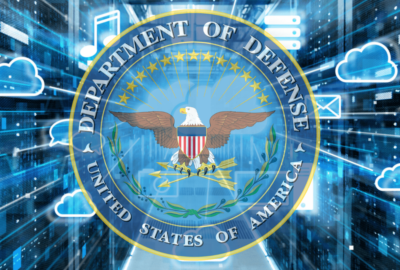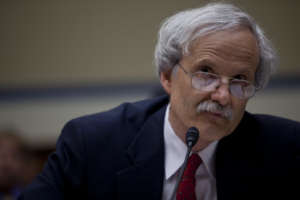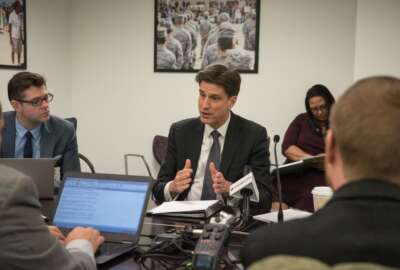

Federal News Network asked three legal experts to review and comment on the Court of Federal Claims’ decision on the protest of DoD’s JEDI cloud procurement.
When Judge Eric Bruggink handed down his decision on Oracle’s protest of the Defense Department’s JEDI cloud contract on July 12, many legal experts were more than mildly surprised.
And when the US Court of Federal Claims released the judge’s mostly unredacted decision 14 days later, the rationale behind the ruling in favor of the Defense Department strategy and against Oracle’s claims of conflicts of interest and arbitrary decisions didn’t quite put the case to rest.
The biggest question that still remains is what will Oracle do next, if anything? Will the Redwood City, California company file an appeal with the federal court or will they just say enough is enough?
At the same time, new Defense Secretary Mark Esper promised to take a “hard look” at the Joint Enterprise Defense Infrastructure (JEDI) program. Last Friday, DoD Chief Information Officer Dana Deasy provided more details of what those “education sessions” would look like and said the Pentagon would not award the contract until Esper completed his review.
On top of all of this, the DoD inspector general continues its review of the JEDI program, and it’s unclear if the FBI’s investigation is continuing or has ended.
With the JEDI drama far from over, Federal News Network asked legal experts to weigh in on Bruggink’s decision. Similar to our reporting when Oracle filed its initial protest with the Government Accountability Office, we asked Steve Schooner, Nash & Cibinic professor of Government Procurement Law and co-director of the Government Procurement Law Program at the George Washington University, Antonio Franco, a partner with PilieroMazza PLLC, and Charles Tiefer, a professor of government contracting at the University of Baltimore Law School, to provide some analysis.
Tiefer: It’s typical of judges in the Court of Federal Claims that they don’t comment on issues that they consider moot. Standing is a high hurdle in that court. It’s problematic though that he’s not taking this as a mere challenge to the request for proposals. Instead, he seems to be rendering a final judgement even though on final judgement the judge has a relatively broad scope. He uses the narrow scope more typically found with a preliminary judgement on RFP than with a total judgement. So that is disappointing.
It does not sound like he will allow Oracle to appeal from the final award of either final bidders.
Schooner: While there’s a certain appeal to the judge’s approach, which gives a fair amount of deference to the procuring agency and keep the wheels of government turning, it’s still a troubling read. As someone who perceived the initial acquisition strategy as falling somewhere between flawed and risky, the opinion did little to obviate those concerns.
There’s an attractive logic — particularly for a judge — to the outcome here. Oracle’s greatest challenge, throughout, was that it did not meet all of the solicitation’s stated requirements. Once the judge concludes that Oracle didn’t have a realistic shot at being competitive, and thus couldn’t show prejudice and, accordingly, lacked standing, everything else in the decision is window dressing.

Given the rapid — and, let’s be frank, unpredictable — evolution of cloud computing technologies and approaches, a 10-year, sole-source relationship seems like a high-risk strategy. So, for example, it’s no surprise the judge rejected the sole source justification (even if he concluded that Oracle was in no position to gain a remedy as a result). Moreover, the judge correctly identified the fallacy underlying a relationship based upon fixed prices for tasks that have not yet been identified. Throw the conflicts into the mix — and again, the judge did not find that the conflicts didn’t exist or the relevant players acted appropriately; he merely deferred to the contracting officer who is under enormous pressure to complete this procurement — and, well, it’s not a pretty picture.
For example, it’s not surprising that the judge found the determinations and findings inadequate. But that doesn’t matter because Oracle cannot demonstrate prejudice as a result of the flawed D&F. Some of the court’s language is eye-opening.
While DoD, no doubt, breathed a sigh of relief that the protest was denied, I can’t imagine they’re terribly happy with the decision. And I don’t expect that the folks at the Defense Acquisition University will find much to emulate in this procurement process. Among other things, as the judge explained: “The facts on which Oracle rests its conflicts of interest allegations are certainly sufficient to raise eyebrows. The contracting officer concluded that at least two DoD officials disregarded their ethical obligations by negotiating for Amazon Web Services employment while working on this procurement.” The opinion includes page-after-page detailing conflicts, which, if you didn’t know how the case came out, would lead most readers to assume that the protest would be granted. Among other things the court notes that, with regard to employment discussions during acquisition planning: “Mr. [Deap] Ubhi in fact hid relevant information and misdirected both DoD and AWS.” Ouch. All of which is particularly frustrating because this is such a large, important, long-term, high-profile procurement.
I keep returning to this passage:
“The contracting officer is fundamentally correct: if there was a high speed train headed toward a single award decision, Mr. Ubhi was merely a passenger on that train, and certainly not the conductor. Moreover, he exited DoD prior to the substance of the evaluation factors being crafted. Although the CO correctly found the assurances in his affidavit to be untrustworthy, we ultimately agree with the substance of her conclusion that his self-promoting, fabulist and often profanity-laced descriptions of his own role were merely that.”
It’s not a pretty picture.
Franco: Overall, the Court of Federal Claim’s decision does not come as a complete surprise. The judge reasonably recognized that DoD’s justification for a single award was improper; however, Oracle’s concession that it could not satisfy minimum gate criteria 1.2, in order to be considered a viable competitor, put it at a severe disadvantage in demonstrating prejudicial error, a concession that the court could not overlook. To be successful in this protest, Oracle had to satisfy two legal standards. First, the court is to determine whether the procurement official’s decision lacked a rational basis or the procurement procedure involved a violation of a regulation or procedure. Second, if the answer is yes, then the court must determine whether or not the protester was prejudiced by said error. Because Oracle conceded on the record that it could not meet Federal Risk Authorization Management Program (FedRAMP) authorization (representing the DoD’s minimum security requirements for processing or storing DoD information) even with the court’s recognized procurement error, Oracle was not prejudiced by such error. As such, no further analysis from the court was really required, which is why this reasoning took center stage in the court’s initial two-page ruling.
Franco: If the gate criteria were not a factor in the procurement, it is possible the court’s decision could have come down differently. Since the court found the D&F relied on an exception to 10 U.S.C. § 2304(a)(d)(3) that did not accurately reflect the structure of the JEDI cloud solicitation, the court could have also found that Oracle was prejudiced by such error. Under this scenario, Oracle’s concession to gate criteria 1.2 would be non-existent and Oracle would stand a better chance of being awarded the contract under a multiple-award scheme.

Tiefer: The outrageous single award is so contrary to the statutes on competition that it should have been enough to deceit this structure of single award contract. The agency’s rationale for single award was way off base. The agency giving a single award for 10 years of JEDI is as noxious as 10-year single award to Halliburton for $30 billion for the entire Iraq war.
Schooner: This is only conjecture at this point, but, in light of the judge’s decision, you might say it would have been more likely than not. Indeed, Judge Bruggink did a nice job articulating that all of the major players outside of DoD, other than AWS, were skeptical of the single-award approach. That’s telling.
Schooner: I’m hesitant to read too much into that aspect of the case. We have decades of precedent – as well as GAO bid protest regulations – that make clear that protests only provide remedies for interested parties. I don’t think many readers will see this case as breaking new ground with regard to standing. Frankly, unless it unduly restricts competition — and, of course, the “unduly” qualifier is the critical aspect — agencies have every right to limit the competition to firms that they perceive as qualified and capable to meet their needs. Also, as a general rule, establishing pre-qualification criteria serves an important public interest, in that (generally) it discourages firms from wasting valuable bid and proposal costs pursuing business opportunities (or specific contracts) for which the government would not consider them.
Franco: The judge found the various gate criteria imposed by DoD to be enforceable, even though it was applied as part of the first step of the evaluation process. If an agency can plausibly demonstrate that its gate criteria is being used to ensure its evaluation was not wasted on offerers who could not meet the agency’s minimum needs, more agencies could begin to use such gate criteria in the first evaluation phase of future procurements.
Tiefer: For the judge to let the agency do whatever it likes with the requirements to shut out competition is like letting the agency get away with homicide with their name written on the weapon–homicide of the shut-out bidders with the agency fully taking responsibility and credit for the deed. I sure hope that other agencies don’t imitate this and usher in a dark period of awards without real competition by coming up with gate criteria that are extremely biased toward one particular bidder.
It seems like the agency in slanting the award toward Amazon looks like it’s headed for a train wreck with the White House interfering against Amazon.
Franco: Oracle may have a leg to stand on as a result of the Court’s determination that the D&F relied on an exception that did not accurately reflect the structure of the JEDI cloud solicitation. Although the Court ultimately found Oracle could not demonstrate prejudice as a result of the flawed D&F, such a decision recognizing an inconsistency in the solicitation could form the basis for Oracle to appeal to the Court of Appeals for the Federal Circuit.

Schooner: Other than lobbying or, of course, getting President Donald Trump to intervene, it looks like Oracle’s protest has run its course. Frankly, I think that’s a shame. While I’m disinclined to suggest that Oracle was the right horse for DoD to ride on this endeavor, my sense is that Oracle’s relentless pressure, and their attorneys’ cogent and compelling advocacy, performed a public service in exposing what is, ultimately, a much messier procurement than we’d like to see.
The related question, of course, is whether the judge opened the door for a challenge from Microsoft [if they lose the contract to AWS], particularly on the single-award issue. We can’t know if he intended to do so, but I read the decision to all but beg Microsoft to enter the fray to force DoD’s hand to expand towards a multiple-award outcome, consistent with Congress’ clear preference.
While I’m deeply troubled by President Trump’s involvement in this procurement, given his long-term, fully transparent animus towards the apparent awardee and his demonstrated practice of acting on instinct rather than in-depth knowledge of relevant details, this may be a rare example of bad behavior leading to a positive result.
While DoD survived the protest, the judge’s lengthy decision made clear that the procurement process left much to be desired, both with regard to an inordinate number of conflicts of interest — I’ll stop there, but the judge’s deference to the contracting officer was as disappointing as it was unusual — and a highly controversial and, to my mind, deeply flawed, acquisition strategy.
Tiefer: This judgement is the death knell for Oracle’s protest at the trial court level. They can take it up to the federal circuit. It’s largely, if not completely, a question of law that is fit for appellate scrutiny. Oracle shouldn’t have to lie down on the ground in a coma waiting until the protest of the final award to Amazon or Microsoft. There have been appeals even in a less striking case. There are opportunities to appeal from an initial RFP that knocked out a potential bidder. I think the federal circuit would take this appellate responsibility and jurisdiction.
Copyright © 2025 Federal News Network. All rights reserved. This website is not intended for users located within the European Economic Area.
Jason Miller is executive editor of Federal News Network and directs news coverage on the people, policy and programs of the federal government.
Follow @jmillerWFED




